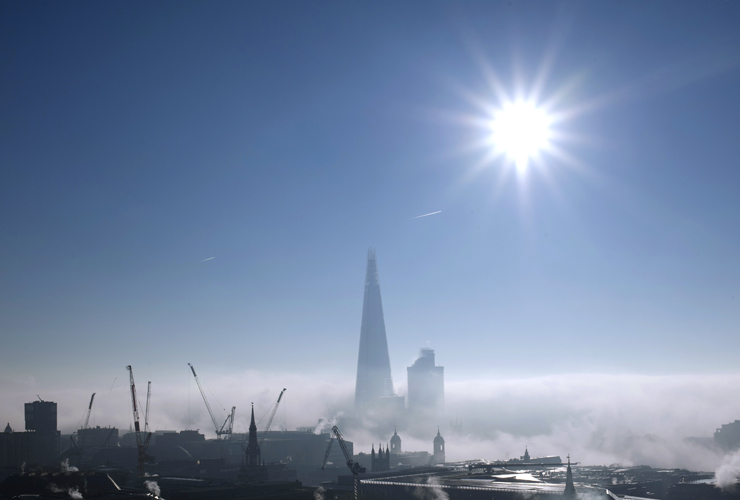London to be ‘as hot as Barcelona’ by 2050
New study to demystify climate change predicts huge rise in global heating

A free daily email with the biggest news stories of the day – and the best features from TheWeek.com
You are now subscribed
Your newsletter sign-up was successful
London will be as hot as Barcelona in 30 years, according to a study on the expected impacts of the climate crisis.
The report, which attempts to demystify climate change, also predicts that by 2050 Edinburgh will feel like Paris, Leeds will resemble Melbourne and Moscow will be like Sofia.
Around a fifth of cities, including Jakarta, Singapore, Yangon and Kuala Lumpur, will experience weather conditions currently not seen in any major cities in the world.
The Week
Escape your echo chamber. Get the facts behind the news, plus analysis from multiple perspectives.

Sign up for The Week's Free Newsletters
From our morning news briefing to a weekly Good News Newsletter, get the best of The Week delivered directly to your inbox.
From our morning news briefing to a weekly Good News Newsletter, get the best of The Week delivered directly to your inbox.
Global heating will rise by as much as 3.5C in European cities in summer and 4.7C in winter, according to the study of 520 major cities published in the journal Plos One.
The Guardian warns that if warmer temperatures in the UK seem “enticing”, the change “could be accompanied by severe drought”.
The Times, too, says that “Mediterranean summers will come at a cost”, pointing out that heatwaves in Barcelona have forced the city “to spend millions of euros on importing drinking water”.
Jean-Francois Bastin, lead author of the research paper, said it aims to “help people visualise the impact of climate change in their own city, within their lifetime”.
A free daily email with the biggest news stories of the day – and the best features from TheWeek.com
He adds: “History has repeatedly shown us that data and facts alone do not inspire humans to change their beliefs or act.”
Professor Mike Lockwood, from the University of Reading, said: “Bringing Barcelona's climate to London sounds like it could be a good thing - if you don't suffer from asthma or have a heart condition, that is - except London clay shrinks and is brittle if it gets too dry and then swells and expands when very wet.”
He adds: “As ever, there is destructive and unforeseen devil in the details of climate change.”
Also lining up to put global warming in context is Richard Betts, a professor of climate impacts at Exeter University and head of the climate impacts strategic area at the Met Office Hadley Centre.
Speaking of the unprecedented conditions forecast for cities such as Kuala Lumpur, he says: “Without the benefit of knowing that the new climate conditions are already liveable somewhere in the world, it is harder to know whether people will be able to adapt and stay in these cities, or whether they will eventually look to move elsewhere.”
In a separate development, the UK’s Committee on Climate Change published a report yesterday saying the government was completely unprepared for the likely repercussions of the climate crisis. Its chairman, Lord Deben, said: “The whole thing is run by the government like a Dad’s Army. We can’t possibly go on with this ramshackle system; it doesn’t begin to face the issues. It is a real threat to the population.”
-
 Gwen John: Strange Beauties – a ‘superb’ retrospective
Gwen John: Strange Beauties – a ‘superb’ retrospectiveThe Week Recommends ‘Daunting’ show at the National Museum Cardiff plunges viewers into the Welsh artist’s ‘spiritual, austere existence’
-
 Should the EU and UK join Trump’s board of peace?
Should the EU and UK join Trump’s board of peace?Today's Big Question After rushing to praise the initiative European leaders are now alarmed
-
 Antonia Romeo and Whitehall’s women problem
Antonia Romeo and Whitehall’s women problemThe Explainer Before her appointment as cabinet secretary, commentators said hostile briefings and vetting concerns were evidence of ‘sexist, misogynistic culture’ in No. 10
-
 The plan to wall off the ‘Doomsday’ glacier
The plan to wall off the ‘Doomsday’ glacierUnder the Radar Massive barrier could ‘slow the rate of ice loss’ from Thwaites Glacier, whose total collapse would have devastating consequences
-
 Can the UK take any more rain?
Can the UK take any more rain?Today’s Big Question An Atlantic jet stream is ‘stuck’ over British skies, leading to ‘biblical’ downpours and more than 40 consecutive days of rain in some areas
-
 As temperatures rise, US incomes fall
As temperatures rise, US incomes fallUnder the radar Elevated temperatures are capable of affecting the entire economy
-
 The world is entering an ‘era of water bankruptcy’
The world is entering an ‘era of water bankruptcy’The explainer Water might soon be more valuable than gold
-
 Climate change could lead to a reptile ‘sexpocalypse’
Climate change could lead to a reptile ‘sexpocalypse’Under the radar The gender gap has hit the animal kingdom
-
 The former largest iceberg is turning blue. It’s a bad sign.
The former largest iceberg is turning blue. It’s a bad sign.Under the radar It is quickly melting away
-
 How drones detected a deadly threat to Arctic whales
How drones detected a deadly threat to Arctic whalesUnder the radar Monitoring the sea in the air
-
 ‘Jumping genes’: how polar bears are rewiring their DNA to survive the warming Arctic
‘Jumping genes’: how polar bears are rewiring their DNA to survive the warming ArcticUnder the radar The species is adapting to warmer temperatures